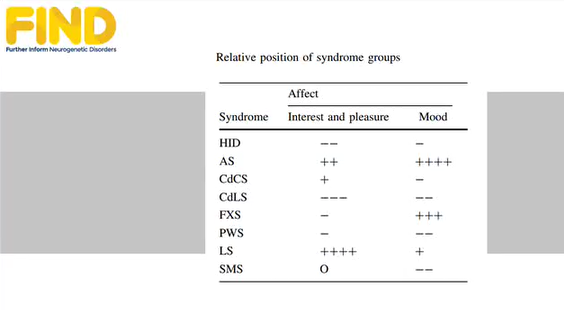Mood, Interest and Pleasure
Research suggests that some individuals with Cornelia de Lange syndrome may experience low mood
Following on from the study described in the short film above, a recent research study compared people with Cornelia de Lange syndrome to people with Cri du Chat and fragile X syndromes over time. Information on mood, interest and pleasure was collected on two occasions (two years apart). The results showed that individuals with Cornelia de Lange syndrome had lower mood than the two other groups at both time points. Lower mood was characteristic of older adolescents (over 15 years) and adults with Cornelia de Lange syndrome. The older group also experienced lower levels of interest and pleasure in their environment. Individuals aged 19-22 years were reported to experience the lowest levels of interest and pleasure overall; however, this part of the analysis had very small numbers of individuals participating, so should be treated with caution. Overall the findings fit with previous research that has reported that 11% of individuals with Cornelia de Lange receive a diagnosis of depression. However, it is important to remember that every person is an individual and low mood is not inevitable.
The researchers looked at the factors that were predictive of low mood in Cornelia de Lange syndrome. They found that insistence on sameness and Autism Spectrum Disorder characteristics, as well as older age, predicted low mood scores over time. This fits with previous research that has show that changes in routine or unpredictable environments lead to low interest in activities and low mood. Later adolescence may be a particularly difficult time because of the changes that occur during this period to people’s routines, such as leaving school.
Health difficulties have been linked to low mood in people with intellectual disability so these should be monitored regularly in Cornelia de Lange syndrome.
You can download the original research paper here.




